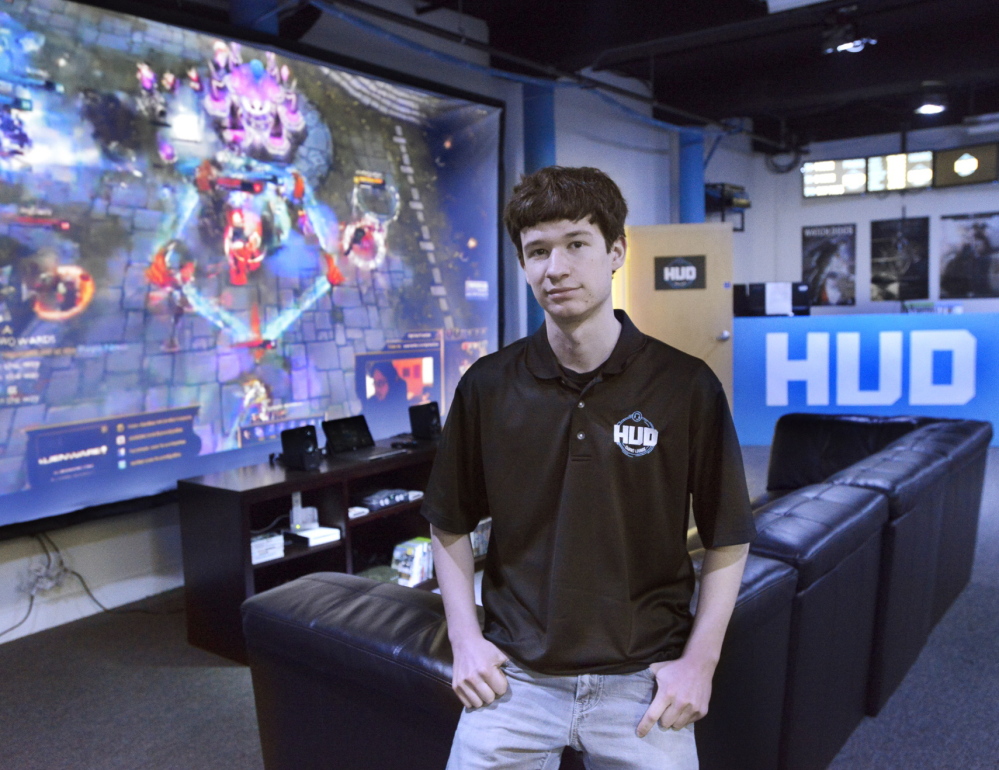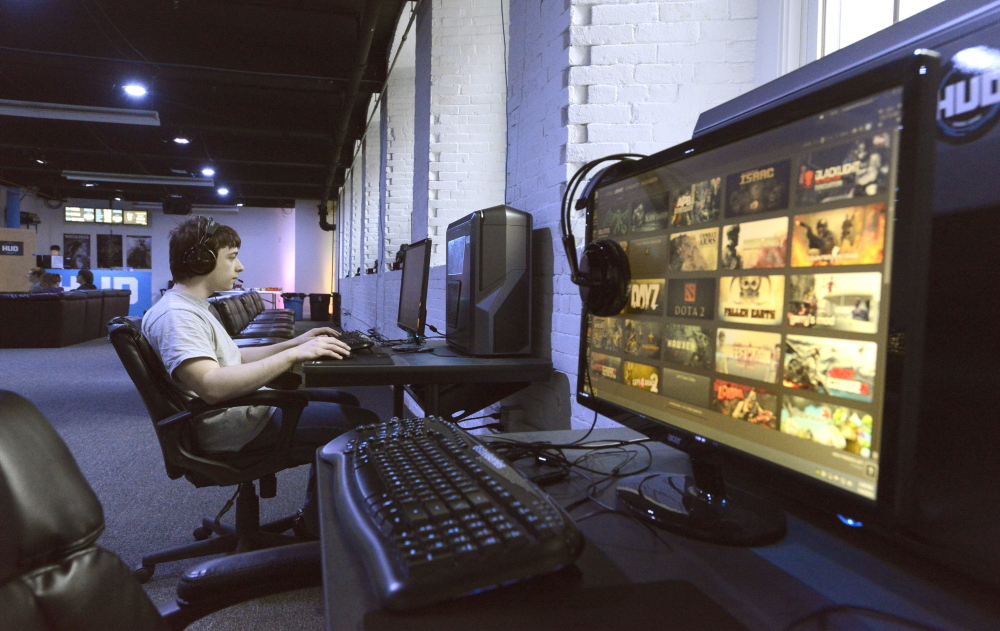BIDDEFORD — Gabe Letourneau thinks he is on to something.
Standing in the middle of his new gaming lounge, the 18-year-old Saco resident spoke with barely contained excitement about his goal of getting gamers out of their basements and into a more social setting. He recently opened HUD Gaming Lounge, a high-tech haven for video game enthusiasts who want to play against others, try out the newest games or watch online competitions between professional gamers.
The lounge, bathed in blue light and lined with custom-built gaming PCs, is similar to the gaming centers that are popular in Asia but only just starting to catch on in North America. The Biddeford lounge is the first of its kind in the area.
“In South Korea, there’s one of these on every corner,” Letourneau said. “This is something no one in the area thought was a thing.”
Letourneau said gaming lounges popped up across Asia along with the growing popularity of e-sports, or electronic sports played in organized tournaments. He is hoping to tap into the rise in popularity of competitive gaming in the United States and eventually expand into locations outside of southern Maine.
Roughly 192 million people in the United States play electronic games, mainly through social media or on smartphones. Many of those people wouldn’t consider themselves serious gamers, but there are about 30 million dedicated gamers across the country, according to SuperData, a New York-based research firm that focuses on the gaming industry.
Worldwide, more than 71 million people watched competitive gaming in 2013, double the number who did the previous year. About half of that audience is in the United States.
Last October, the Staples Center in Los Angeles sold 18,000 tickets in an hour to the “League of Legends 3” world championship, which was watched by 32 million people, said Joost Van Dreunen, CEO of SuperData. “League of Legends,” a multi-player battle arena game that is free to play online, is played by roughly 27 million people each day.
And not only are a whole lot of people playing and watching, they spend a lot of time doing it.
The average e-sports viewer watches 19 times a month for 2.2 hours at a time, according to the firm’s data. About 60 percent of e-sports enthusiasts in the U.S. are between 21 and 35, according to SuperData research.
The idea of gaming lounges is relatively new in the United States because it is part of the world where many people already have computers at home. In Asia, far more people depend on Internet cafes and gaming lounges for access to computers and games, Van Dreunen said.
While computer access is less of a challenge here, American gaming lounges can offer high-end equipment and a more social atmosphere.
“It really does take that experience out of the basement and makes it a lot more social,” Van Dreunen said of gaming lounges. “It’s somewhat of a return to the original arcade. It can be a lot of fun and adds a new layer to the gaming experience.”
The HUD Gaming Lounge is tucked in the basement level of the North Dam Mill, a cavernous building where generations of millworkers once churned out textiles that were shipped around the globe. It’s a spot that is not that conducive to attracting passers-by, but one that is perfect for hosting late-night gaming because the sound doesn’t disturb neighbors, Letourneau said.
Two walls are lined with 12 high-end computers, some with as many as three screens. Another wall features TVs hooked up to two of the most expensive new – and hard to come by – game consoles on the market: Playstation 4 and Xbox One.
A large projection screen allows gamers to play on older systems, but more often is used to watch e-sport competitions or videos of gamers playing the most popular titles on the market. The room is dotted with black leather couches and is dimly lit with blue-tinted lights.
Customers pay $3 an hour or $5 for two hours to play. They can also buy day passes for $10 or an eight-day pass for $50. The lounge is open for daily play, but also hosts tournaments and viewing parties for e-sports events.
Letourneau opened the business with Eli Hanright, a limited partner and fellow gamer, and financial backing from a silent investor. It took $40,000 for computer equipment plus another $15,000 for other costs to get the business up and running.
Van Dreunen said the amount of capital investment needed for such a business could make it difficult for entrepreneurs to open gaming lounges, but a popular lounge can find success once it establishes a strong customer base.
Part of the appeal of lounges like HUD is that they provide both regular gamers and casual players an opportunity to try new games and play on the expensive computer setups that provide the best gaming experience, Letourneau said.
“Unfortunately, it’s very expensive to buy PCs. For the average person the cost is too high to allow them to make that investment,” Letourneau said.
Alex Hall, 21, of Biddeford drops into the lounge a few times a week when he’s not working as a butcher. He likes trying new games but, more important, appreciates the high-speed Internet connection that allows him to play without lags. He said he also likes being able to play with other gamers, many of whom he never would have met otherwise.
“This gives us all some common ground,” he said.
Last week, 14-year-old Mikel Souliere of Biddeford dropped in after school to show the lounge to a friend and try out the Xbox One. He said he especially enjoys watching more experienced gamers.
“This is the best way to spend your paycheck,” he said.
In the month that the gaming lounge has been open, Hanright said he has seen many strangers bond over their shared interest in a particular game or e-sports in general.
“It gets people out of the house,” he said. “Everyone here just joins in and you’ll see the whole room playing a game together.”
Letourneau, a 2013 Thornton Academy graduate who has been playing electronic games as long as he can remember, knows a thing or two about the lack of face-to-face interaction typically associated with gaming. He spent his high school’s prom night in his basement playing PC games.
“As well as online multi-player gaming does at connecting people from all over the world to play together, it lacks true human face-to-face interaction,” Letourneau said. “We’re trying to change that.”
Gillian Graham can be contacted at 791-6315 or at:
Twitter: grahamgillian
Send questions/comments to the editors.





Success. Please wait for the page to reload. If the page does not reload within 5 seconds, please refresh the page.
Enter your email and password to access comments.
Hi, to comment on stories you must . This profile is in addition to your subscription and website login.
Already have a commenting profile? .
Invalid username/password.
Please check your email to confirm and complete your registration.
Only subscribers are eligible to post comments. Please subscribe or login first for digital access. Here’s why.
Use the form below to reset your password. When you've submitted your account email, we will send an email with a reset code.